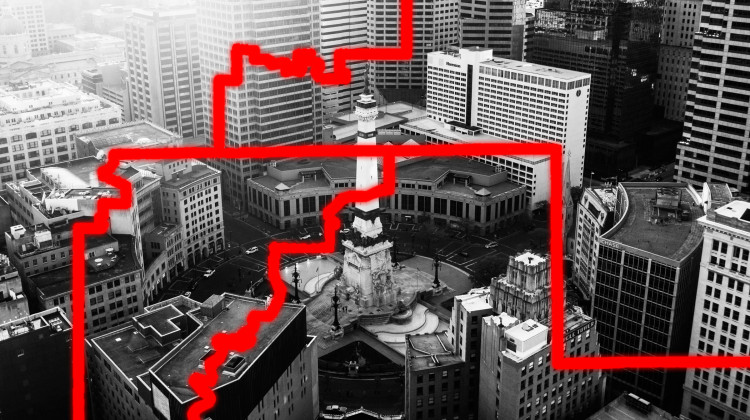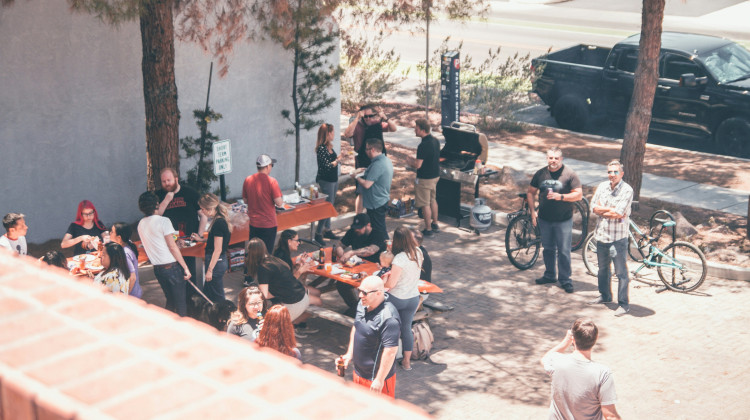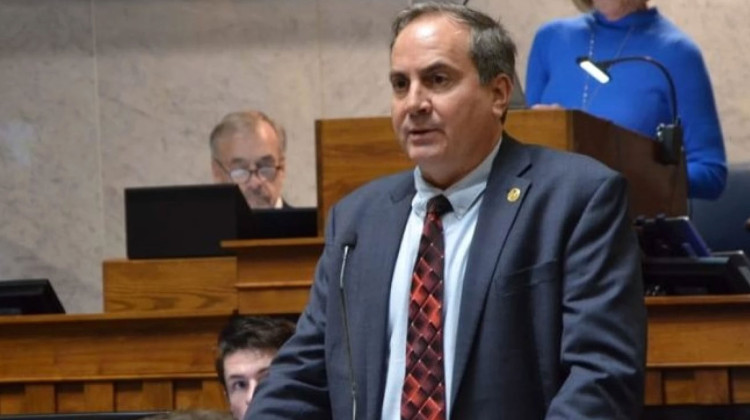
Michael Warren has spent about $400 out-of-pocket this summer to fill potholes in his Indianapolis neighborhood.
Annie Ropeik/IPB NewsWhen you drive over a pothole in your neighborhood, you can report it to the city and hope they come fix it soon – or you can fix it yourself. At least, that’s what one Indianapolis man has been doing this year.
Michael Warren’s project, which he calls Open Source Roads, reveals a lot about the different ways residents and governments try to care for their communities.
Warren is a one-person roads crew. He carries everything he needs on his bike – brooms, shovels, traffic cones – and goes looking for potholes. He cleans them out, fills them with asphalt and tamps them down flat.
He’s done this for dozens of potholes since late April, in his home neighborhood on the city’s near east side.
Warren says these side streets, lined with overgrown yards and abandoned houses, are low priority for the city.
“If they’re not doing it, then we need to. I think we should get back to maintaining our communities, just take a primary role in that,” Warren says.
Indianapolis Department of Public Works spokeswoman Betsy Whitmore says they’re happy Michael Warren wants to help – but worried about his safety, being in the road.
He also technically needs a permit to work on city property. But most of all:
“We’d rather work with you so that we have records of what’s been patched, and make sure that we’re keeping all of our data,” she says.
That data tells the city where work’s been done, and where it needs to happen next.
Whitmore wants citizens to report potholes to the mayor’s action center. She says the DPW has filled more than 14,000 potholes through that system alone this year.
Compare that to Michael Warren: He’s filled about 70 potholes in a few months, spending as much as $400 out of pocket.
That’s about $6 per pothole, while the city spends nearly $150 for each pothole reported by a citizen. And its average response time is about a week.
“Sometimes these solutions don’t come right away, because we do have to manage resources pretty tightly,” Whitmore says. “We don’t have unlimited funding.”
Warren says, why wait? He wants to start a nonprofit so he can take donations to keep filling those little side street potholes, while the city handles the main roads.
“I think it’s useful because it tells us how bad the situation is,” says Indiana State Rep. Ed DeLaney.
DeLaney is a Democrat from Indianapolis who voted for the state’s road funding plan, which will give communities more money to spend on what their roads need.
He says that’s his problem with Warren’s idea.
“The reason we have a community is, that we make decisions together,” DeLaney says. “And so I don’t think this concept can work, and will cause a lot of chaos and disruption.”
He says he understands the frustration in neighborhoods that feel ignored by city priorities. But he thinks fundraising to pay for improvements could have unintended consequences.
“I don’t want to be a witness to the conversation that says all the rich areas have nice streets now,” he says. “That literally fractures a community.”
While Warren fills and patches on the near east side, a driver gives him a thumbs up. Warren says once his neighbors see he isn’t kidding, they support him.
“Just because it’s illegal doesn’t mean it’s wrong,” he says. “Clearly this is a public good. This is a community service. This should be championed.”
Warren is moving away soon, to Virginia, for a dream job with a software company. But his Open Source Roads project isn’t stopping.
He plans to put some of his new paycheck toward starting his nonprofit and enlisting others in his effort. And until he leaves, he’ll keep patching potholes in his city, one by one.
 DONATE
DONATE







 View More Articles
View More Articles


 Support WFYI. We can't do it without you.
Support WFYI. We can't do it without you.